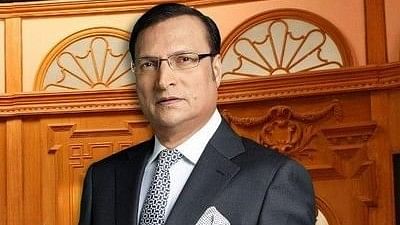
Journalist Rajat Sharma.
Photo: X/ @RajatSharmaLive
New Delhi: The Delhi High Court has ordered removal of social media posts made by senior Congress leaders Jairam Ramesh, and others, including Pawan Khera and Ragini Nayak, accusing senior journalist and TV anchor Rajat Sharma, of the use of abusive language against the woman spokesperson during a discussion on June 4, 2024.
Justice Neena Bansal Krishna said it is prima facie evident that the plaintiff had barely intervened for a few seconds and no abusive language was used against Nayak and the irreparable loss would be caused to him in case the injunction was not granted.
"Even though there was no abuse... but in subsequent videos, insertion has been made...which prima facie seems to be a total misrepresentation of the true facts and convoluted insulations have been made which are targeted at damaging the reputation of the plaintiff," the bench said.
The court noted the X posts berating the plaintiff are nothing but an "oversensationalisation and depiction of facts which are patently false".
Sharma had filed a suit seeking permanent injunction and damages of Rs 100 cr from the Congress leaders.
The court found substance in the contention of senior advocate Maninder Singh, appearing for Sharma that no abusive words were used by him.
The bench felt the balance of convenience also lies in favour of the plaintiff for the simple reason that by making these videos private or injuncting them from being available on the public platforms, would not, in any way, infringe on the rights of the defendants of freedom of speech and expression which they can, in any case, exercise within the defined parameters.
The court also said while the threshold of public criticism and alleged defamatory X posts/Tweets and YouTube videos on intermediary platforms is much higher, but the individual dignity and honour of a person cannot be allowed to be defamed or disrepute brought to him on the ground of right of free speech and expression.
"A thin line of distinction exists between defamation and public criticism and an onerous task lies with the courts to maintain this delicate balance between the competing claims and rights," the court said.
Citing the apex court in the case of Amish Devgan Vs Union of India, (2021), the court said it had been ruled that dignity is the quintessential quality of personality and a basic constituent along with honour and reputation of the rights guaranteed and protected under Article 21.
Dignity is a part of the individual rights that form the fundamental fulcrum of collective harmony and interest of a society. While right to speech and expression is absolutely sacrosanct in the sense that it is essential for individual growth and progress of democracy which recognises voice of dissent, tolerance for discordant notes and acceptance of different voices, albeit the right to equality under Article 14 and right to dignity as a part of Article 21 have their own significance, it pointed out.
The court directed that the X posts or tweets, which have not been removed, be removed within seven days by defendants in terms of the Intermediary Guidelines. It also directed that the videos which are in the public domain be made private and not to be put in the public domain, without the orders of this court.
